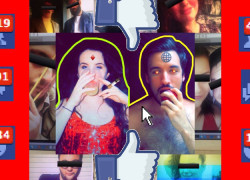
Words by Brianna Bullen
#dancelikenobodyiswatching #literalsexkitten #nothingissafe #DIVERSITY #cultofZuckerberg #NelsonMandelasaid #MEME #LIKESHARECULL #thisisgettingkindofdark #davidlynchmeetsyoutubepoop #LITERALLYstars #surrealsketchcomedymostlysurface #butsexyandbiting #surrealpostmodernfun
The cast of Cull are unabashedly confident when mocking the usual suspects of social media: from cat videos to fit-bros and ‘the informed’ (“what even is Syria, anyway?”), to Wi-Fi demanders and the false confidence of online communication. Nothing, and no one, is safe in their efforts to cull their Facebook annoyances and friends – neither of which are mutually exclusive. An all singing, all dancing affair manned by Honor Wolff and Patrick Durnan Silva, Cull includes dances inspired by Facebook leading to wielded selfie-sticks, and ends as a post-ironic celebration of the cult of Mark Zuckerberg.
The pair are so high-energy and high-intensity that their minimalist stage often threatens to topple. The horror movie-inspired lighting and soundscape works effectively in the surreal descent down the rabbit-hole of social media addiction. But the acting—and enthusiastic overacting—is the star of the show. The show itself is a bizarre mix—sometimes working, sometimes not—of surreal horror, absurdity, social satire, slapstick, musical theatre, and smut.
Shows like this, which rely so heavily on the cultural moment and its associated references, have a tendency to date and shut out audience members not in on the joke. Cull, in most cases, avoids this problem by focusing on the absurd, very human but exaggerated behaviour that surrounds these specific pop-cultural features.
For example: a pair of friends enthusiastically and repeatedly agree to meet up over Facebook, because they feel they can say anything to each other. But when they meet, they of course have nothing to say: a phenomenon many of the audience would be all too familiar with.
A self-mocking rendition of Anna Kendrick’s Cup Song (which takes an operatic swerve) derives humour from the self-effacement of its characters. “I’m so pitchy, I can’t believe we’re uploading this.” “Oh my god, shut up you were great, I was terrible!” – because it’s okay to be self-deprecating and have low self-esteem, but confidence even in your flaws? In the paraphrased words of an earlier pair of fitness-fuelled, baby-sacrificing Instagram-star characters: “You monster.”
Another technique Cull uses to avoid this is taking the sketches into surreal directions, which even those unaware of references will be entertained by. There is a nightmarish quality to these sequences which cause discomfort alongside the laughs. The pair is certainly unafraid to go dark, and this creates a memorable punch to the material that it would otherwise lack. But sometimes their pursuit of the absurd takes them in directions that obscure the actual absurdity of the situations, lacking reflective bite.
This is perhaps the biggest drawback: despite the dark underbelly that it effectively showcases, Cull tends to play safely at the surface with subject matter, maybe out of necessity in such a fast-paced sketch format. . This does, ironically, often works in the show’s favour: in a performance referencing the internet, the rapid flitting from one sketch to another without reflective time actually mirrors scrolling through a feed.
Long pauses, jerky handling of time, odd repetitions, bizarre synchronised dance moves, exaggerated acting, and unexpected trips into the nightmarish effectively mimic a surreal David Lynch atmosphere. Overall, it’s a laugh-out-loud, outrageous, high-octane ride into the uncanny of the internet.

